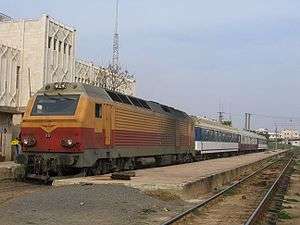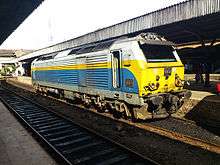Alstom Prima diesel locomotives
The Prima Diesel-electric locomotives are a class of medium and heavy, four- and six-axle, passenger and freight mainline locomotives.[1] They have been built both to 1,435 mm (4 ft 8 1⁄2 in) standard and 1,668 mm (5 ft 5 21⁄32 in) broad gauges, and find use in the Middle East, Europe and North America. Alstom is the primary designer in cooperation with both General Motors (now EMD) and Siemens.
| Prima | |||||||
|---|---|---|---|---|---|---|---|
 A Syrian Railways Prima DE 32 AC | |||||||
| |||||||
| |||||||
History

Initially the Prima locomotives were electric only, with the technology demonstrator and test platform being built in 2002[2] in Belfort France by Alstom. Next came the Prima 6000 technology demonstrator; this too was an electric locomotive, with 6000 kW of power and primarily intended to test and demonstrate multi-voltage operations for European cross-border operations.[3] Orders for the Prima electrics came, mostly from SNCF.
A series of diesel locomotives also associated with the Prima name were also built. These were the General Motors (GM)-engined machines built by Alstom at its Spanish plant in Valencia, and Ruston-engined locomotives built in Belfort, France.
The Valencia plant was sold to Vossloh in 2004. Locomotives continued to be built there using EMD engines and electrical transmission systems - including almost total rebuilds of the RENFE 333 class. Vossloh changed the names of the products produced there to the "Vossloh Euro" platform[4] (see Vossloh Euro locomotives) and the end came of the association of the Valencia plant with the Prima name.[5]
Also produced in the 1990s were Prima diesels countries outside Europe. The DE32C was produced for Chemins de Fer Syriens in Syria, and Sri Lanka received 10 locomotives which it designated M9 class. A DE43C model was exported to Iran (AD43C[6]). Nevertheless, the Euro 3000 and Euro 4000 products produced at Vossloh España continue to show similarities with the earlier Prima products[5]—such as the centrally located driver position with radially located controls, the single drivers window, and general body shape and design of the rigid body shell.
Alstom and Siemens collaborated to produce the BB 75000 diesel, which has received orders for at least 400 locomotives from SNCF with a possibility of 100 more. A Siemens/Alstom BB 75000 mock-up was unveiled on 25 March 2004,[7] The first locomotive was produced in 2006.
In 2008 Alstom unveiled the 'Prima II' platform;[8] diesel versions are to be offered,[9] so it is expected that further models of the Prima diesel locomotive family will appear.
Technology
The Prima type locomotives built at Alstom's Valencia plant were engined with General motors engines; in fact the entire power train - engine, generator, electronics and motors were supplied by General Motors for the Valencia built Primas. For the locomotives built in France - primarily those exported outside Europe Ruston engines were used. The Prima diesels for SNCF Fret used MTU engines.
Modern innovations in the Prima class included - a centrally located drivers seat with ergonomically arranged controls, a monocoque rigid bodyshell.
The BB 75000 retains the Prima appearance - the single window, drivers position, body design, but the 'innards' are supplied by Siemens, the engine from Caterpiller.
Variants
| Type | Operator (name) |
Engine | UIC wheels |
v km/h |
Number built |
Build date | Notes |
|---|---|---|---|---|---|---|---|
| JT 42BW | Israel Railways | EMD 710 V12 | Bo'Bo' | 140 | 48 | 1996-2006 | Primarily passenger use |
| JT 42CW | Israel Railways | EMD 710 V12 | Co'Co' | 110 | 8 | 1996 | Primarily freight use |
| AD 32C | Sri Lanka Railways (M9) | Ruston RK 215 V12 | Co'Co' | 110 | 10 | 1997-2000 | 1676mm gauge. Engine de-rated from 3220 hp to 1800 hp |
| DE 32 C AC | Syrian Railways (LDE3200) | Ruston RK 215 V12 | Co'Co' | 120 | 30 | 1999 | Built for Syrian Railways, 2,160 kW (2,900 hp) of power at wheel.[10] Also referred to as AD 33.[11] |
| JT 42HW-HS | EWS (Class 67) | EMD 710 V12 | Bo'Bo' | 200 | 30 | 1999-2000 | Mixed use |
| DE 43 C AC | Iranian Railways (AD43C) | Ruston RK 215 V16 | Co'Co' | 110 | 100 | 2000-2009 | A passenger version is specified with a 150 km/h top speed. First 20 units built by Alstom, remainder by Wagon Pars, Iran |
| PL42AC | NJT | EMD 710 V16 | Bo'Bo' | 160 | 33 | 2003-2006 | Single ended machines for passenger use |
| Class 333.3 | RENFE | EMD 645 V16 | Co'Co | 120 | 92 | 2000-2005 | 1668mm gauge. Rebuilt from 1970s Macosa built, NOHAB design, EMD engined RENFE 333 - only EMD 645 engine plus generator retained |
| Class 333.4 | RENFE | EMD 645 V16 | Co'Co | 160 | 8 | 2003- | 1668mm gauge. Rebuilt from RENFE 333.3 subclass for higher speed use on passenger services |
| DE30BAC | SNCF (BB 75000) | MTU 4000 R41 16V | Bo'Bo' | 120 | 400 | 2006-2015 | Collaboration between Alstom and Siemens (approx. 60:40 split). Based on design elements of SNCF BB 27000 'Prima' (bodyshell) and 2016 'Eurorunner' (traction equipment). Engine is from MTU as per Rh 2016 |
| Sources - see individual articles (linked first column), except where noted | |||||||
RENFE 334
These were the last of the Valencia-built Prima locomotives and technically should be considered part of the Vossloh Euro series of locomotives since they came off the production line after 2004. Built for passenger work on non-electrified lines in Spain, and were intended to replace older Class 333s.
References
- Alstom Launches Prima Locomotive Range International Railway Journal
- Prima platform: electrical locomotives. Railcolor.net
- Alstom Prima 6000 Demonstrator: Introduction. Railcolor.net
- Diesel heavy haul across Europe eurotrib.com
- Brief description of all Primas except BB75000 : Railcolor.net Archived 20 February 2012 at the Wayback Machine
- Alstom AD43C : Rail.lu
- SNCF Fret BB 37000: Introduction. Railcolor.net
- Prima II unveiled by Alstom Railway Gazette International 23 May 2008
- ALSTOM Transport Archived 13 August 2011 at the Wayback Machine, 25 February 2009, via conferinte.club-feroviar.ro
- Sources:
- "PRIMA DE 32 C AC diesel locomotives, Syria". www.transport.alstom.com. Alstom. Archived from the original on 17 October 2005.
- "Picture Gallery - Directory: /pix/ne/Syria/diesel", www.railfaneurope.net
- "CFS locomotives and trainsets", www.railfaneurope.net
- Sources:
- "SYRIA", www.meed.com, 26 November 1999
- "Other Middle East Railways : SYRIA", Harakevet (40)
External links
| Wikimedia Commons has media related to Alstom Prima diesel locomotives. |
- "Новые локомотивы компании Alstom", Железные дороги мира (in Russian) (10), 1998, archived from the original on 4 May 2007